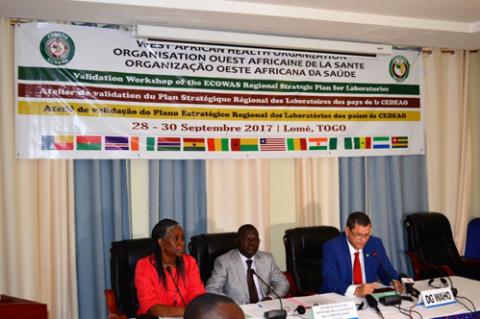
Date: 2017-09-28 18:15:52 ID: 1716
Lome, 28 September 2017 – The deliberations of the workshop to develop a regional strategic plan for laboratories in ECOWAS started in Lome (Togo) this Thursday 28 September 2017, in the presence of representatives of the Ministries of health of ECOWAS countries, and several representatives of technical and financial partners, as well as members of staff of the West Africa Health Organisation (WAHO).
The opening ceremony was marked by three speeches, particularly the welcome address of the Director General of WAHO, the speech of the WHO representative in Togo, representing the Regional Director of the WHO Africa Bureau, and finally that of the representative of the Minister of health and social protection of Togo.
The DG of WAHO, Dr Xavier CRESPIN, after thanking the high authorities of Togo, commended the presence of WAHO’s partners and representatives of the Ministries of health of ECOWAS countries.
He thereafter gave an overview of the regional situation characterised by the reoccurrence of epidemics, which have raised the critical importance of strengthening national disease surveillance, inter-sector coordination and cooperation among countries to enable the detection of epidemic outbreaks and thereby provide rapid and effective response to minimise losses in human life.
These numerous epidemics, he continued, have highlighted the weak capacity of laboratories in their essential role of research and biological confirmation. That is why WAHO, through its strategic plan, committed itself to strengthening the capacity of laboratories through an analysis of the current laboratory systems and their capacity to detect epidemic-prone diseases; the establishment of a regional network of laboratories within ECOWAS; the establishment of a regional bio-bank and the designation of the regional reference laboratories, indicated the DG of WAHO.
Dr Crespin concluded his speech by calling on all partners to mobilise resources to support the region in order to improve the detection and confirmation of diseases for the improved management of epidemics and other public health emergencies. The WHO representative in Togo, representing the WHO Regional Representative for Africa, Dr Imboua Lucile, called on participants to seize the opportunity of the workshop “to provide a new impetus to the development of regional diagnostic capacities that will enable countries to prevent and promptly respond effectively to threats of infection, in line with the ONE HEALTH approach”. The regional strategy in line with the ONE HEALTH approach was adopted in November 2016 in Dakar, indicated Dr Imboua.
The Minister of health and social protection of Togo, represented by the national Programme Coordinator for AIDS control, Professor DAGNRA Anoumou Yaotse, first of all thanked WAHO for choosing Togo as the host country for the regional meeting. He thereafter congratulated WAHO for having succeeded in establishing the ECOWAS Regional Centre for Disease Control and Surveillance (ECOWAS/RCDCS) and for its assistance to countries for the establishment of the National Institutes for Disease Control and Surveillance with a non-negligible laboratory component.
The minister pointed out the relevance and importance of the validation workshop on the regional strategic plan for ECOWAS laboratories because “the regional plan will enable countries to have a reference framework for the development of national plans”.
Before concluding his speech, Professor DAGNRA Anoumou Yaotse gave assurance of the support of the togolese authorities, and particularly that of the Minister of health, Prof Moustafa MIJIYAWA to WAHO and to all activities undertaken for the benefit of the region and countries.
The Minister of health and social protection of Togo, Professor Moustafa MIJIYAWA, later in the morning paid a surprise visit to participants and reiterate the togolose Government’s support to WAHO’s activities in the region.
This three-workshop, organised with the support of the World Bank, aimed principally at validating the regional strategic plan for laboratories and more specifically validating the plan to strengthen reference laboratories, the strategies to strengthen equipment maintenance, and finally, the monitoring and evaluation mechanisms for the implementation plan.
The development and validation of the RSP for laboratories and the plan for strengthening reference laboratories are important steps for the capacity building of laboratories in ECOWAS member States with a view to the operationalisation of the ECOWAS/RCDCS.
